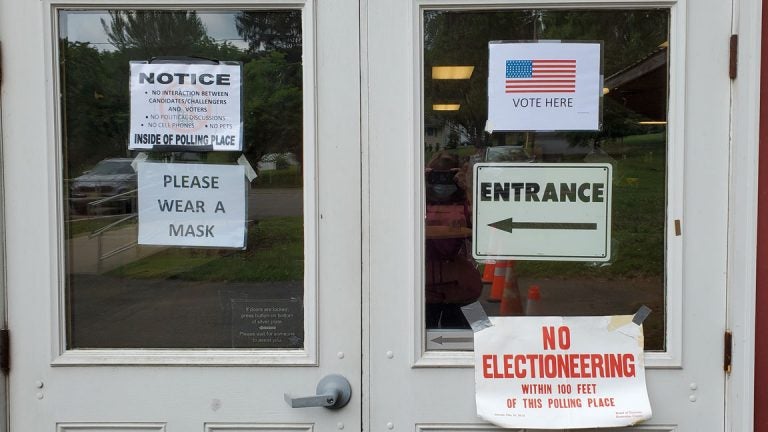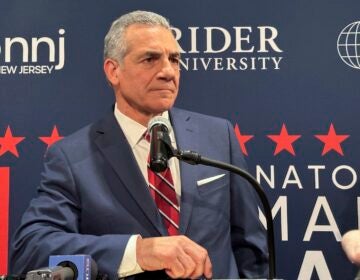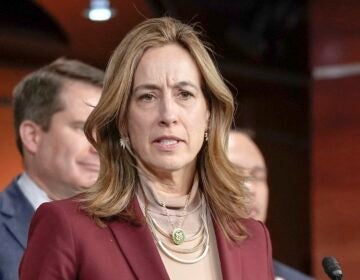N.J. primary 2021: Ciattarelli tops in GOP governor contest with some tense Democratic legislative races
The four-way battle for the GOP gubernatorial nomination was the main draw statewide.

A polling station in High Bridge, Hunterdon County. (NJ Spotlight)
This story originally appeared on NJ Spotlight.
New Jersey Gov. Phil Murphy will face former Assemblyman Jack Ciattarelli, the most moderate of the four Republican candidates who ran in Tuesday’s primary, in November’s general election.
The party line was the big winner in legislative races, with all the incumbents or well-known candidates who were backed by the Democratic or Republican parties beating equally well-known candidates who were not endorsed. This includes Democratic Assemblyman Gordon Johnson, who will likely be the next state senator in the 37th District in Bergen County.
Partisan voters chose their candidates for governor, state Senate and Assembly and county and local offices, voting Tuesday in large numbers in person for the first time in 18 months.
Polls closed at 8 p.m. across New Jersey, with some places reporting a robust turnout, although primaries tend to draw fewer voters. Four years ago, just a quarter of the state’s registered Democrats and Republicans voted in a hotly contested primary. A Rutgers-Eagleton Poll conducted in late May and released Tuesday said just 22% of registered voters knew Tuesday was Election Day, though once told when the primary was, more than half said they planned to definitely vote.
This year, Murphy breezed to the November ballot without primary opposition as two Democrats who had filed both were disqualified for not meeting the signature requirements.
The four-way battle for the GOP gubernatorial nomination was the main draw statewide for the nearly 1.5 million registered Republicans in New Jersey. The Associated Press called the race for Ciattarelli a little before 10 p.m. With 93% of the votes counted, he was leading with slightly less than half the votes cast. Ciattarelli’s two top rivals, both aiming to capture former President Trump’s base, collected more votes as a pair than the more moderate Ciattarelli.
The gloves are already off in the governor’s race between Ciattarelli and Murphy.
“The choice in November is clear. We can either keep New Jersey moving forward or go backward,” Murphy said, citing his signing the $15 minimum wage law and his progressive stands on abortion rights and college affordability.
“As Blue states led by Democrats like Phil Murphy have suffered from dismal job recovery numbers and oppressive madidates, Republican states continue to lead the way. After years of disastrous results from liberal policies, Garden Staters are ready for Republican leadership,” countered Rachel Lee, a spokeswoman for the Republican National Committee.
Ciattarelli, of Hillsborough, was considered the Republican front-runner — he was endorsed by Republicans in all 21 counties — and had spent 10 times more than his rivals as of the 11-day pre-election filing with the state Election Law Enforcement Commission (ELEC), or close to $6 million. Ciattarelli tried to present himself as a moderate while supporting Donald Trump and courting the former president’s conservative base. Ciattarelli campaigned as a presumptive nominee frequently criticizing Murphy, while also casting doubt on Republican candidate Hirsh Singh’s efforts at painting himself as the most pro-Trump candidate.
Singh channels Trump
Singh, an engineer who largely self-financed his campaign and has lost Republican primaries for governor, U.S. Senate and House of Representatives in the last four years, called his main opponents “Never-Trumpers” and adapted the former president’s campaign mantra claiming he would “Make New Jersey Great Again.” Singh and Ciattarelli engaged in one heated debate, held by the NJ 101.5 radio station. Singh canceled at the last minute his appearance in the other debate required by the state’s public financing laws that was to be sponsored by NJ Spotlight News and NJ PBS after declining to follow its virtual format or take a COVID-19 test.
Although both Ciattarelli and Singh qualified for the debates, only Ciattarelli received matching funds under the state public financing program, getting $4.4 million through June 2. Phil Rizzo, a pastor and real estate developer, raised more money than Singh — $624,000 versus $550,000 — but missed the matching funds deadline so he neither got state financing nor qualified for the debates. Like Singh, Rizzo campaigned as a pro-Trump candidate. The fourth candidate was Brian Levine, a former Somerset County freeholder who tried to run for governor once before. Levine expected to spend less than $5,800 on his campaign.
Rizzo had captured 26% of the vote and second place. Singh polled 21%, while Levine took about 3% of the vote.
While the Republican winner would appear to have history on his side in seeking a win in the November general election — no Democratic governor has won reelection in New Jersey in more than 40 years — Murphy had a 55% approval rating in the most recent Eagleton poll and led Ciattarelli in a head-to-head matchup, 52% to 26%. The state’s voters also skew heavily Democratic, with the 2.55 million registered Democrats outnumbering both Republicans and independents.
The strength of the preferential ballot treatment given to candidates endorsed by their county political committee was a common theme in the most hotly contested legislative races. While most of the partisan primary races were uncontested, there were challenges for 19 Senate and Assembly slots.
The 37th, the most-watched district
The most-watched was the battle among Democrats for one Senate and two Assembly nods in the 37th District in and around Hackensack in Bergen County. At center stage was the Senate fight between two sitting Assembly members with near identical voting records to try to succeed retiring fellow Democrat and majority leader in the Senate, Loretta Weinberg. Johnson declared victory around 11 p.m. and with all votes counted, he defeated Assemblywoman Valerie Vainieri Huttle by a three-to-one margin. Johnson was backed by the Bergen County Democratic Committee, while Vainieri Huttle ran as the more progressive candidate under the banner Real Bergen Democrats.
Each ran with a full slate of Assembly candidates: Johnson with Tenafly Democratic Chair Shama Haider and former Englewood Cliffs Councilwoman Ellen Park, and Vainieri Huttle with Teaneck Councilwoman Gervonn Romney-Rice and Tenafly Councilwoman Lauren Kohn Dayton. Vainieri Huttle’s ticket sought to deliver only the second district in the state to be represented by three women, while Johnson’s touted several firsts — himself as first Black senator for the district, and Haider as the first Muslim and first Pakistani Assembly member in the state with Park as the first Korean Assemblywoman.
The power of the party line also seemed to sway voters in the 26th District, which covers parts of Morris, Essex and Passaic counties. There, the two incumbent Republican Assembly members, Jay Webber and BettyLou DeCroce, ran against one another. Webber paired with Christian Barranco as both got the backing of the Morris County GOP. The AP declared Webber victor and he outpolled all other candidates by more than 3,000 votes. Barranco was leading DeCroce by 500 votes with 99% of the vote counted.
DeCroce got the support of the Essex and Passaic Republicans in her independent campaign. The Passaic GOP also endorsed Barranco. A fourth candidate, Thomas Mastrangelo, ran separately and was running in fourth place.
In Monmouth County’s 13th District, Assemblywoman Serena DiMaso ran off the line after losing favor with the county Republican chairman and lost her reelection bid. Assemblyman Gerard Scharfenberger instead paired with Vicky Flynn and both were endorsed by the Monmouth GOP and won, with roughly 2,000 more votes than DiMaso.
Although the line was also a factor in the 20th District race, that race was more a battle of wills between incumbent Sen. Joseph Cryan and Assemblyman Jamel Holley, both Democrats. Cryan won with more than 60% of the vote.
Holley sought to become Union County’s first Black state senator, criticizing what he said was a lack of representation for African Americans in the district by Cryan, Union County undersheriff. Cryan, who received the Union County Democratic endorsement, was critical of Holley’s position on COVID-19 precautions and vaccines; Holley has opposed legislation that would mandate vaccination for public school students. Each ran with his own ticket: Cryan with Assemblywoman Annette Quijano and Rev. Reginald Atkins, a former Roselle councilman, and Holley with Christian Veliz and Diane Murray-Clements.
In another closely watched race in Atlantic County’s 2nd District, endorsed Republican Vince Polistina easily bested Seth Grossman, who ran unsuccessfully against then-Democrat Jeff Van Drew in 2018 for an open U.S. House seat and lost GOP backing for some controversial comments about race and diversity. The margin was more than two-to-one. November will mark the second time that Polistina has sought to represent the district in the Senate; in 2011, he also won his party’s Senate nomination but then lost in the November election.
Ties to George Norcross
The results in at least two races, in the 37th and 26th districts, may also have been influenced by hundreds of thousands of dollars in dark money pumped into them. A report Monday from the Election Law Enforcement Commission showed an independent spending committee with ties to South Jersey Democratic boss George Norcross spent almost $700,000 of a total $722,000 in outside spending for Johnson or against Huttle in the 37th. The greatest dark money spending through May 25 was more than $900,000 spent by five organizations in the 26th District race.
The primary winners and candidates who file to run as independents will face one another in the November general election.
The primary election was the first one statewide to be conducted primarily in person in 18 months, as last year’s elections were conducted mostly using mail-in ballots. Still, close to 200,000 people had submitted mail-in ballots leading up to Election Day, more than in any previous primary prior to 2020.
New Jersey has a closed primary, so Democrats and Republicans vote for their respective candidates. Unaffiliated voters can cast ballots by declaring a party at the polls. The total turnout is not likely to be known until next week after all valid mail-in ballots are tallied.
WHYY is your source for fact-based, in-depth journalism and information. As a nonprofit organization, we rely on financial support from readers like you. Please give today.







